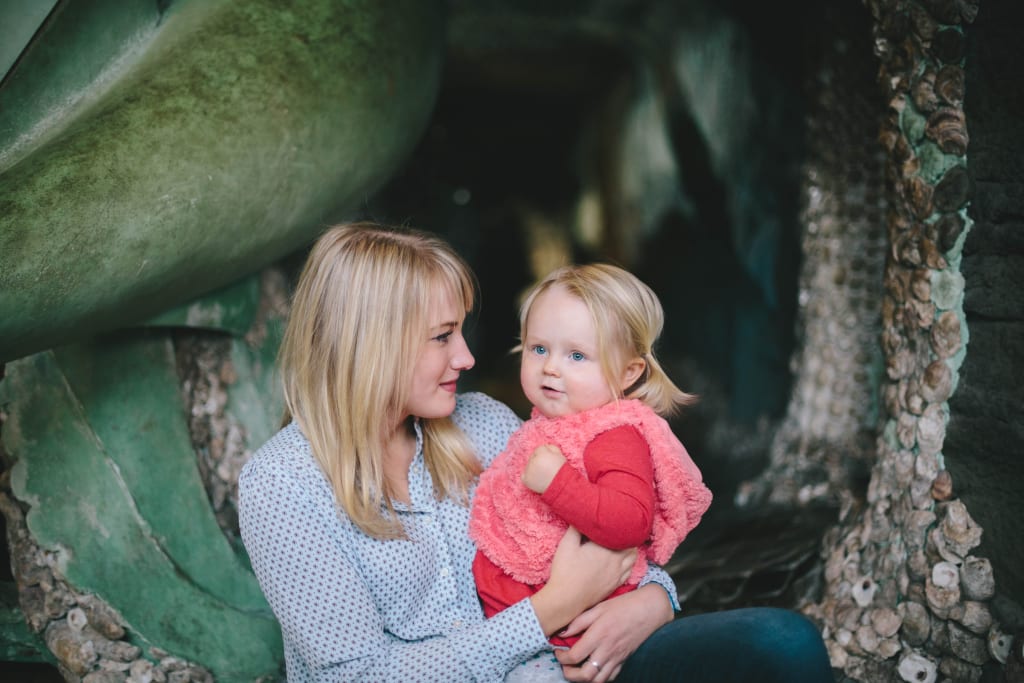Why Helicopter Parenting Is Toxic
Research shows that helicopter parenting is toxic for children in more ways than expected, even long after they leave the nest.

According to research from Grinnell College, helicopter parents tend to be too watchful over their children, overprotective, and even suffocating in the form of too much praise, gifts, and assistance.
While many helicopter parents don't parent the way they do with bad intentions, this style of parenting is harmful on growing children in a plethora of ways: emotionally, mentally, physically, socially, and psychologically.
Since research found that, among all generations, millennials are considered the "most protected and programmed" of them all, it's important that we touch on the topic of helicopter parenting to shed light on why helicopter parenting is toxic.
Children with helicopter parents are more likely to develop mental disorders.
Anxiety and depression are two common mental disorders helicoptered children are more prone to developing. While, for some children who were exposed to helicopter parenting, anxiety and depression may be temporary, it sticks with many others.
With strict parenting and more limitations than freedoms, children may develop learned helplessness in which they feel they have no freedom or capability to succeed. They may feel trapped, and in turn, may develop depression.
As for anxiety, helicoptered children may feel like the world is a big threat if the fear from their mom or dad taught them to mistrust and be extra cautious. Even after leaving the nest, those who were helicoptered may feel anxious or panicky when put in situations they were taught to fear.
Those with helicopter parents are more likely to engage in risky behavior.
Ironically, those with helicopter parents are more likely to engage in risky behaviors, such as smoking and binge drinking. Despite teaching their children to be perfect little angels, the nerve-wracking effects of helicopter parenting may draw children closer to bad influences.
There are many logical reasons for the latter. For some helicoptered children, the stress, anxiety, and feelings of stagnancy coming from their parents' parenting style may encourage them to experiment with drugs and alcohol in order to relax.
Some children, when they receive unhealthy parenting styles, may be inclined toward rebelling as a way to protect themselves from over control, going from one extreme to the next just to feel some sense of freedom as they gravitate away from their toxic parent/child relationship.
Helicopter parenting is a step back when it comes to gender equality.

According to statistics, 13 perent of females were helicopter parented growing up compared to just 5 percent of males, putting a huge damper on the fight for equality.
The issue with the latter isn't the fact that females are more likely to be helicopter parented, but the fact that the reason they are more likely to experience this type of parenting is often due to the underlying fear parents may have toward the society-deemed "weaker" female.
To "protect" from teen pregnancy, domestic abuse, and rape, parents may be overprotective of their daughters, especially when other males (e.g., boyfriends, male friends) are in the picture. They forget their sons can also take part in the latter.
As a result, helicopter parenting may have a more adverse effect on females in some aspects. They may only become more dependent and fearful of doing things for themselves, but also innately consider themselves the "weaker" gender, or even consider all males "bad."
Children who were helicopter parented have a harder time with independency.
Even when helicopter parents finally let loose of their children and give them more freedom, being independent often feels "wrong" and absurd to helicoptered children, often even into adulthood. Meanwhile, other all of their friends have no issues with being independent.
When driving, shopping, or house hunting on their own, there might be a little voice that tells helicoptered young adults that they can't do it on their own, or that they need to get someone's approval first.
After all, throughout childhood, helicoptered children were living through the lenses of their mom or dad. Even as young adults, they may not have developed adequate decision-making skills if they were never allowed to as a child, or had their ideas constantly shut down by their parents.
Adapting to minor life changes is significantly harder for children with helicopter parents.
Usually, with helicopter parenting, comes heavy restrictions and rules. For example, children may not be able to search the Web without constantly being eyed, even with parental control software put in place, or they may not be able to spend the night at a friend's house, ever.
Instead of "protecting" children from "dangers" though, preventing children from experiencing things or doing things on their own hinders their ability to adapt to minor life events and changes. Helicopter parenting doesn't allow children to learn from their mistakes if they can't make any.
Children may frequently second guess themselves when making a minor decision, with fear being at the forefront of their mind (e.g., "Is this safe," "Am I capable of taking on any consequences this may pose?").
Children of helicopter parents are more likely to develop social and relational problems.

Helicoptered children, even into adulthood, may have difficulty making and keeping friends and romantic relationships if they were essentially taught by their helicopter parents that people are dangerous.
As many know, what love is and how to give and receive love are learned in the home setting. Growing up, some helicoptered children may be more attracted to partners that are more demanding and controlling, just like their parents growing up.
Selecting a partner like the latter, helicoptered children may be more likely to find themselves in unhealthy relationships and friendships, akin to the impact of psychological abuse in children. In extreme cases, they may be more prone to putting themselves in abusive situations, or may develop a poor attachment style to their partner.
Helicopter-parented children are more likely to make decisions not based on what they want, but on what others think.
With limited opportunities to be independent and think for themselves, always having mom or dad decide for them, children with helicopter parents may see most decisions not as options, but as right or wrong answers.
As young adults, helicoptered children may be overwhelmed rather than excited by the idea of making their own decisions. They may not trust themselves to make a good decision, partly because they have little experience with it and partly because they were taught that they can't.
Learning to make decisions isn't just a freedom; it's a developmental process. In fact, the prefrontal cortex, the brain region responsible for decision making, develops into early adulthood. Unfortunately, prefrontal cortex development can be permanently stunted by helicopter parenting.
Helicoptered children might feel more paranoid or on edge, even after moving out.
Not all helicopter parents watch their children like a hawk, but for the ones that do, children might feel more paranoid than their non-helicoptered counterparts, constantly feeling as if someone is watching or about to get them in trouble.
Even when a child raised with helicopter parents is not doing anything wrong on the computer or when writing something inappropriate down on paper, they may automatically feel the need to hide what they're doing. The need for privacy, for many helicoptered children, can't always be met.
As a result of feeling like others are watching them and judging them, children in school may feel embarrassed completing tasks or doing things in front of others. Even after moving out, they may still feel like they have to watch their backs and hide things from their parents.
Those with helicopter parents may develop a fixed mindset, giving up quickly and only doing what is "easy" or "safe."

Indirectly teaching their children to develop a fear of failure, which stems from a helicopter parent's own fears, children may grow up to develop what Carol S. Dweck defines as a fixed mindset. A fixed mindset is a form of black-and-white thinking, which has several adverse effects.
Due to fear and insecurity, those with a fixed mindset may find challenges and obstacles impossible, be quick to give up, and be more inclined to go for the easier routes, even if it means not being as fulfilled. In turn, issues with relationships, careers, school, and the like may occur.
In a healthy environment where helicoptering parenting does not exist, children may instead develop a growth mindset. This is the mindset that can prepare one for working through complicated challenges, learning new things, taking risks, and achieving a versatile thought process.
The negative effects of helicopter parenting sticks with children through life.
Many may believe that once a child grows up and steps foot into the world as an independent, young adult that the negative effects of helicopter parenting will suddenly disappear. Unfortunately, this isn't true in most cases. Even many young adults are still suffering.
Statistics found that college students who grew up with helicopter parents differ significantly from those without such. In fact, the helicoptered college students still showed signs of limited self-growth, difficulty coping with change, lower creativity, and emotional regulation problems.
With a different set of issues than the average college student, those who are helicopter parented may be less likely to do well in college, graduate, or even deal with the struggles of finding a job. Therefore, the effects of helicoptering parenting don't just end at adulthood.
Conclusion
Every parent has their own way of doing things. While there's no harm in being a worried parent who wants the best for their children, high intensity helicopter parenting is considered strict parenting gone mad.
There are many reasons that make it clear why helicopter parenting is toxic not just for children, but also for helicoptered young adults and beyond. Becoming aware of one's own parenting style and knowing how to mediate a balance is crucial to raise confident, happy, wise children.
About the Creator
Mike Mavenful
Baby boomer, Pharmacologist, Movie reviewer and proud grandfather.






Comments
There are no comments for this story
Be the first to respond and start the conversation.